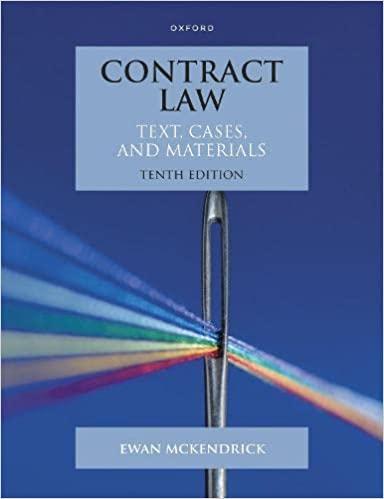Question
Men, boys, and their families have filed more than 18,000 lawsuits against Johnson & Johnson and several of its affiliates, alleging that their use of
Men, boys, and their families have filed more than 18,000 lawsuits against Johnson & Johnson and several of its affiliates, alleging that their use of the drug Risperdal caused gynecomastia, or enlargement of male breasts that in many cases, required surgery to correct.One Alabama teen alleged that his breasts grew to 46 DD before he underwent corrective surgery.A few of the early cases have gone to trial, with some plaintiffs winning, but others ruling for J & J, saying that the plaintiffs didn't prove Risperdal caused their enlarged breasts.Adults and children with gynecomastia frequently experienced humiliation and psychological trauma and emotional distress due to embarrassing breast growth.
The powerful antipsychotic drug was approved by the FDA in 1993 for the treatment of schizophrenia in adults.Thereafter, some doctors began prescribing it for other mental illnesses, acute manic or mixed episodes associated with bipolar I disorder, and irritability associated with autism and related conditions.A J & J subsidiary marketed the drug to doctors for use in children, and many kids were prescribed the medication even though the U.S. Food and Drug Administration had not yet approved the drug for pediatric use.The lawsuits allege that J & J marketed the drug to doctors for this off-label use until 2006, when the FDA approved risperdal for adolescents.It now carries a "black box" warning, the strictest warning label required by the FDA for prescription drugs.[J & J's subsidiary manufacturer also marketed it for use in treating elderly patients with dementia, though the FDA has still not approved the drug for that purpose.]
Risperdal can increase levels of the hormone prolactin. Increased prolactin levels can lead to side effects in females such as loss of periods, increased or irregular production of breast milk, and excessive acne and body hair. Males might experience symptoms such as erectile dysfunction, decreases in body and facial hair, and in some cases gynecomastia the development of female breast tissue. In one of the cases that has been filed, a teenaged plaintiff started taking the drug at age 5 to treat a psychiatric disorder but the family says they never received a warning about breast development.They claim that J&J hid from doctors the results from a study showing the drug could cause abnormal breast development in boys so that the doctors would keep writing prescriptions.
Do you think the Risperdal warnings are defective under Section 402A?Why or why not?Make sure you explain your answer.
You must start a thread before you can read and reply to other threadsMen, boys, and their families have filed more than 18,000 lawsuits against Johnson & Johnson and several of its affiliates, alleging that their use of the drug Risperdal caused gynecomastia, or enlargement of male breasts that in many cases, required surgery to correct.One Alabama teen alleged that his breasts grew to 46 DD before he underwent corrective surgery.A few of the early cases have gone to trial, with some plaintiffs winning, but others ruling for J & J, saying that the plaintiffs didn't prove Risperdal caused their enlarged breasts.Adults and children with gynecomastia frequently experienced humiliation and psychological trauma and emotional distress due to embarrassing breast growth.
The powerful antipsychotic drug was approved by the FDA in 1993 for the treatment of schizophrenia in adults.Thereafter, some doctors began prescribing it for other mental illnesses, acute manic or mixed episodes associated with bipolar I disorder, and irritability associated with autism and related conditions.A J & J subsidiary marketed the drug to doctors for use in children, and many kids were prescribed the medication even though the U.S. Food and Drug Administration had not yet approved the drug for pediatric use.The lawsuits allege that J & J marketed the drug to doctors for this off-label use until 2006, when the FDA approved risperdal for adolescents.It now carries a "black box" warning, the strictest warning label required by the FDA for prescription drugs.[J & J's subsidiary manufacturer also marketed it for use in treating elderly patients with dementia, though the FDA has still not approved the drug for that purpose.]
Risperdal can increase levels of the hormone prolactin. Increased prolactin levels can lead to side effects in females such as loss of periods, increased or irregular production of breast milk, and excessive acne and body hair. Males might experience symptoms such as erectile dysfunction, decreases in body and facial hair, and in some cases gynecomastia the development of female breast tissue. In one of the cases that has been filed, a teenaged plaintiff started taking the drug at age 5 to treat a psychiatric disorder but the family says they never received a warning about breast development.They claim that J&J hid from doctors the results from a study showing the drug could cause abnormal breast development in boys so that the doctors would keep writing prescriptions.
Do you think the Risperdal warnings are defective under Section 402A?Why or why not?Make sure you explain your answer.
You must start a thread before you can read and reply to other threads
Step by Step Solution
There are 3 Steps involved in it
Step: 1

Get Instant Access to Expert-Tailored Solutions
See step-by-step solutions with expert insights and AI powered tools for academic success
Step: 2

Step: 3

Ace Your Homework with AI
Get the answers you need in no time with our AI-driven, step-by-step assistance
Get Started


